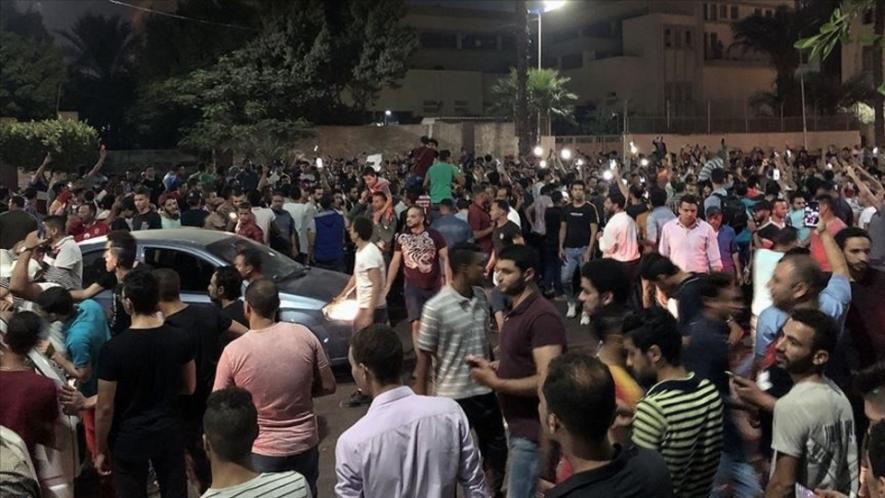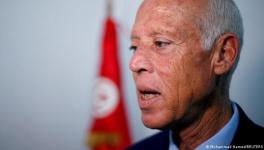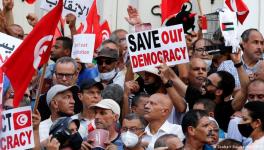Protests Continue Against President Abdel Fattah el-Sisi in Egypt

Protests and resistance to the dictatorial rule of Abdel Fatah el-Sisi in Egypt entered their fifth day on September 24 day even as state repression continued unabated. The protests seeking el-Sisi’s resignation began on Friday, with agitations taking place in major cities, such as Cairo, Suez, Mahalla and Alexandria.
Egyptian police and security forces have tried to crush the protests and have arrested more than 500 people so far. According to the emergency laws in place since the 2013 coup against Mohammad Morsi, protests without prior approval, which is seldom given, are illegal in the country.
The current protests are in response to a call given by Egyptian businessman Mohammad Ali, who is living in exile in Spain. In a series of videos posted on Facebook and YouTube, beginning September 2, Ali alleged that el-Sisi, along with his colleagues in the military, has indulged in widespread corruption. Public money is also being wasted in building luxurious palaces, while common people struggle to survive hardships caused by the failure of his government’s economic policies, he pointed out.
Egypt has been undergoing a severe economic crisis with inflation rates as high as 35%. This has resulted in an alarming rise in the prices of essential commodities, along with the widespread poverty in the country. According to official data published in July, 33% of Egypt’s population was living in poverty in 2018. These statistics only reflect the conservative official poverty rate which is capped at 735 Egyptian pounds or USD 1.40 per day. The World Bank and other global agencies have estimated that close to 55% of the Egyptian population lives in poverty, using the indicator of 950 Egyptian pounds or USD 2 per day.
Egypt is also under an obligation to reduce government spending, as a condition for the USD 12 billion loan received by it from the International Monetary Fund (IMF) in 2016.
Abdel Fatah el-Sisi seized power in Egypt in a military coup, after people took to the streets against the Mohammad Morsi-led Muslim Brotherhood government that was seen to be implementing policies and laws threatening the secular ethos of the country. Morsi was elected to power after the Arab Spring protests, ending the 30-year rule of Hosni Mubarak, in 2011.
In a rare move last week, el-Sisi attempted to defend his economic policies and denied the charges of corruption against him. According to a report by the Independent, he admitted to building palaces, but claimed that they are “not for me, I am building a new state.”
Since the 2013 coup, el-Sisi has won two presidential elections without any serious contenders as his repressive policies have essentially eliminated all possible opposition candidates. After winning his second five-year term, he successfully amended the Egyptian constitution, making it eligible for him to remain in power till 2030.
Along with banning most opposition parties, including the Muslim Brotherhood, el-Sisi’s regime has also restricted trade union activities, making strikes illegal. The majority of the media houses in Egypt have been forced to toe the government line. Moreover, in the name of fighting ISIS and other terrorist organizations, his government has displaced thousands of people, mostly in the Sinai province, with the land being taken over by the military.
Activists have observed that el-Sisi’s policies are even more oppressive than those adopted by Hosni Mubarak. His popularity has gradually declined, not only because of his authoritative policies, but also due to the rising economic hardships faced by common Egyptians. The deteriorating living standards have made the people come out in open defiance against the oppressive state under el-Sisi.
Protests in solidarity with Egyptians were also held in the US and the UK. In New York, where el-Sisi is on a visit to attend the UN General Assembly meet, people gathered in large numbers to protest.
Mohammad Ali has given a call for a “million march” on Friday, which is expected to trigger further large-scale demonstrations.
Middle East Monitor reported on September 23, that the Egypt Officers Front had also come out in support of the popular demonstrations. The Front is considered to be loyal to the former chief of staff of the Egyptian Armed Forces, Sami Anan, who had announced his bid to contest last year’s presidential elections. Its statement on the Facebook claims that “certain officials” in the army will “protect” the demonstrators, as they did in 2011.
Get the latest reports & analysis with people's perspective on Protests, movements & deep analytical videos, discussions of the current affairs in your Telegram app. Subscribe to NewsClick's Telegram channel & get Real-Time updates on stories, as they get published on our website.
























